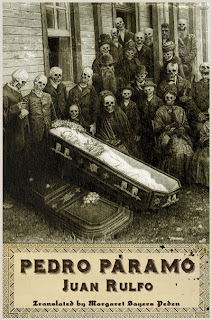 |
| Imaginary cover from here |
(Translated by Lysander Kemp)
"Noises. Voices. Murmurs. Faraway songs."
I first came across the name of Rulfo amoung many other Mexican writers in Roberto Bolano's The Savage Detectives. I had no idea what to expect but the cover looked interesting and the excerpt on the back saying that Rulfo "views history as a tragic circus in which evil impresarios betray clowns by making them believe in their own masquerade" was intriguing.
And this is a strange and intriguing book. On one level this is the story of an immoral, Macchievellian ranch owner which could form the basis for a Sergio Leone film. On another it is a Mexican The Waste Land, with a vertiginous chorus from beyond the grave whispering parts of their stories into our ears as the wind blows the dust through the empty landscape or the rain turns the dust into mud.






